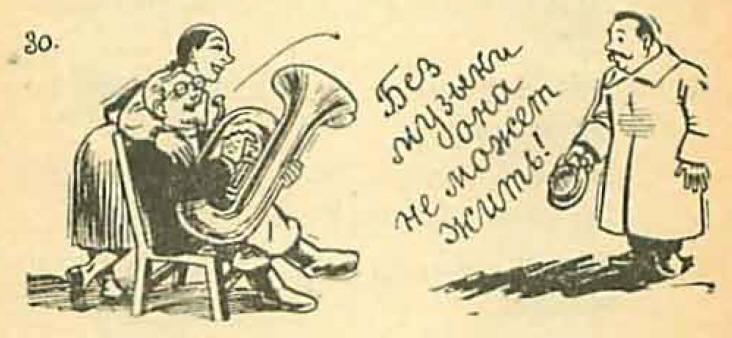
Languages
|
| Russian for English speakers 30 |
 |
| Lesson 30 |
103 | Russian | English Английский |
88 - восемьдесят восемь | eighty eight | |
89 - восемьдесят девять | eighty nine | |
90 - девяносто | ninety | |
91 - девяносто один | ninety one | |
Тридцатый (30-й) урок | Thirtieth lesson | |
УРОК НОМЕР ТРИДЦАТЬ (№30) | Lesson number thirty (#30) | |
| Ещё стакан чаю (1) ? | Another [again] glass of tea? | |
or Ещё стакан чая? | AK: чая (чаю) - "of tea" is "partitive genitive", it's used here to say "some amount of", "a little of" | |
| 1 | Вы любите музыку (2)? | (Do) you (pl.) like music? |
| 2 | Конечно люблю; | Of course (I) like (it); |
| но не могу сказать, что я музыкант. | but (I) cannot say that I (am) (a) musician. | |
но не могу сказать, что я знаток музыки. | AK: You should say "but I can't say that I'm a music expert" | |
| 3 | Вечером, дома, | In the evening, at home, |
| я с удовольствием слушаю радио. | I listen-in with pleasure to the radio. | |
AK: I listen to my radio with pleasure | ||
| 4 | А на концерт, в Оперу (3) вы не ходите ? | But (do) you not go to the concert, to the Opera [on concert., into Opera...]? |
AK: But don't you go to the concert, (or visit the) Opera? | ||
| 5 | Очень редко ; | Very seldom ; |
| к вечеру я устаю, | in the evening I am tired | |
| и ложусь спать довольно рано. | and I go to bed [I lie-down sleep] early enough [enough early]. | |
AK: Rarely. | ||
| 6 | Вы, значит, не любитель музыки (2); | It means (that) you (are) not a lover of music; |
AK: You, (this) means, is no fan of music. | ||
| 7 | для меня самое (4) большое удовольствие в жизни, | for me the greatest pleasure in (my) life, |
AK: самое большое = greatest | ||
| 8 | это слушать хорошую музыку (2). | [this] (is) to listen-to good music. |
| 9 | Ещё стакан чаю (1)? — Пожалуйста. | Another glass of tea? — If you please. |
| 10 | С лимоном? — Да, но без сахара (5). | With lemon? |
| 11 | Слушать, я слушаю, вы слушаете, он слушает, мы слушаем, они слушают. | To listen-to; I listen, you pl. listen, he listens, |
AK: meaning of слушать is "to listen to something as a general action" | ||
| 12 | редко; рано; | seldom; early, |
AK: рано means early | ||
| самый; самая, самое. | the most (masc. ; fem.; neuter). | |
| 13 | стакан чаю or стакан чая; лимон; сахар. | a glass of tea; lemon; sugar. |
УПРАЖНЕНИЕ | EXERCISE. | |
| 1 | Я сейчас ложусь спать. | I go to bed [lie down sleep] |
AK: сейчас means now | ||
Я сейчас же ложусь спать. | I go to bed immediately / at once. | |
| 2 | Вам хочется спать так рано? | You want to go to bed |
спать means to sleep, but here it means rather "to go to bed" | ||
Он сонный | He's sleepy, drowsy, lethargic, etc. | |
Она очень хочет спать | She wants to sleep very much | |
| 3 | Да; я устал; | Yes; I am tired; |
| я сегодня много гулял. | to-day I walked-about very much. | |
AK: I strolled around (for pleasure) a lot today | ||
| 4 | Он редко ходит в театр. | He seldom goes to the theatre. |
| 5 | Дайте ей самый большой стакан, ей очень хочется пить. | Give her the largest [most large] glass, she is very thirsty. |
| 6 | Я надеюсь, что вы хорошо будете спать. | I hope that you (pl.) will sleep well. |
| 7 | Вчера вечером, мы были в театре. | Yesterday evening we have been to [were at] the theatre (S. N. 3). |
| 8 | Без музыки она не может жить. | Without music, she cannot live. |
| 9 | Он никогда не слушает то, что вы ему говорите. | He never listens to what you (pl.) tell (say, are saying) him. |
| 10 | Он большой любитель водки. | He is a great fan |
AK: lover is любовник |
| NOTES | AK-NOTE | |
| 1 | Чаю, of tea is the irregular partitive genitive of чай, tea (s. N. 8). | дай мне немного чаю or немного чая - give me some tea, give (you pl.) me a "little quantity" of tea |
| 2 | Музыка, music, a feminine noun, becomes in the accusative музыку, | |
| 3 | В Оперу, litter. "into (the) Opera". | Prepositions do not "govern" cases. |
| 4 | Самый, самая, самое mean : the most. | большой doesn't mean great in this particular phrase |
| 5 | Whereas с, with, | Again, there is more to it. |
| ДОБАВОЧНОЕ УПРАЖНЕНИЕ. - ([dobavotchnoe], additional, extra exercise). — Let us put in the nominative, accusative, genitive and dative, all the nouns in the lesson. We have : | I will read them without translation, | |
— Стакан, стакан, стакана, стакану. |
|